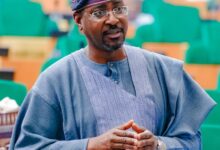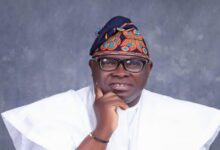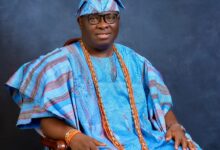Gbenga Daniel and the Politics of Deceit in Ogun State By Oladimeji Abiodun

In the political history of Ogun State since the return of democracy in 1999, no figure has straddled the landscape with as much cunning, controversy, and contradictions as Otunba Gbenga Daniel, popularly called OGD. Once governor of the state for eight stormy years between 2003 and 2011 and now senator representing Ogun East, OGD has always projected himself as a master strategist and consummate political player. But anyone who knows his antecedents will readily agree that he is less a strategist and more a manipulator, a man whose politics thrived on deceit, desperation, and an almost unquenchable appetite for supremacy.
As governor, OGD brooked no opposition. His government became infamous for its hostility to dissenting voices, whether within his party or in the wider state. To oppose him was to attract his wrath. He spared no one, not even the most respected elders of the party in Ogun State. Former President Olusegun Obasanjo, Senator Jubril Martins-Kuye, and Chief Sulaimon Onabiyi were among the leaders who endured his battles, while many others were sidelined or disgraced for daring to disagree with him. Even sympathisers of those he considered adversaries were not safe. He acted like the smartest politician in the state, if not the country, and those who knew him at close range understood quickly that he would rather burn bridges than share glory with anyone else.
OGD is remembered for introducing the word “Ziggy” into the political lexicon of Ogun, a slang he popularised that came to mean deceit and lies. Ironically, this word became an apt description of his own politics. He cultivated the aura of a brilliant tactician, but time and again he was undone by his own arrogance. The late Senator Buruji Kashamu is a classic example. Daniel embraced Kashamu as an ally, not realising that he was welcoming the very man who would later dismantle his political influence. Like a farmer who sharpens the cutlass that eventually slashes his own foot, OGD’s inability to read Kashamu’s motives exposed the limits of his much-touted smartness.
Those who remember the PDP primaries of that era will also recall how Daniel’s political structure further strengthened by the likes of Dapo Abiodun. Contesting against other aspirants including Dapo Abiodun, the incumbent governor of the state, he gained an even stronger footing when Abiodun, having lost to him, demonstrated discipline and loyalty by collapsing his own political structure to work for the victory of the party and its candidate, Gbenga Daniel. This act of sacrifice and party unity gave OGD an added advantage, boosting his confidence and tightening his hold on the political machinery at the time.
If there was any doubt about his poor judgement in choosing battles, his repeated confrontations with former President Obasanjo laid it bare. Had OGD succeeded in politically subduing Obasanjo, he would have strutted around as the ultimate conqueror, but the reality is that he was forced to return to the same man, begging for reconciliation on numerous occasions. Obasanjo himself, in his memoir My Watch, described Daniel in damning terms as a “shifty and dubious character who thinks he is the cleverest of all human beings.” When a man of Obasanjo’s stature and political experience reaches such a conclusion, it is hard to dismiss it as mere bitterness. What wisdom cannot teach, experience will. And experience has shown Nigerians that Daniel is a man whose politics is guided less by vision than by trickery.
His style of governance as governor was equally revealing. Instead of lasting infrastructure, Ogun people got pageantry and showmanship. One kilometre of road in Oke-Ilewo, Abeokuta, was celebrated with pomp as though it were a major feat, yet the road crumbled within a few years. Many of his road projects barely lasted one rainy season, while those constructed by Chief Olusegun Osoba years before him still stand in relatively better condition. OGD’s administration often spent more on ceremonies to commission projects than on the projects themselves. It was governance by optics, not substance, and that legacy remains one of his most damning.
Even after leaving office, OGD’s desperation for power never waned. Rather than focus on his first term as senator, he was already plotting to stop Governor Dapo Abiodun from securing the 2027 senatorial ticket for Ogun East, a seat Daniel had barely started serving. What could be more dishonourable than fighting for a second term before even proving one’s worth in the first? To make matters worse, he is widely believed to have sponsored the PDP candidate in the Remo Federal Constituency bye-election against his own party’s candidate, a treacherous move that ultimately earned him a suspension from the APC. Such anti-party activities only confirm Chief Obasanjo’s description of him: a man who cannot be trusted, even by his own allies.
The desperation that drives Gbenga Daniel is remarkable, if not alarming. Here is a man who owes his Senate seat to the same party and governor he is now plotting against. Here is a man who was nearly prevented from even contesting, yet he quickly turned against those who opened the door for him. If a slave child is rescued by the rich, he must never forget his roots. But OGD, it seems, has long forgotten loyalty, decency, and gratitude.
Reports from the period further reveal the depths of his intolerance. Not only did he allegedly order physical attacks on prominent figures such as Nobel laureate Professor Wole Soyinka and even former Deputy Governor Gbenga Kaka, but he also threatened traditional authority itself. When the Alake of Egbaland raised valid concerns over shoddy road infrastructure in the state, Daniel reportedly threatened to depose the monarch, as though he were God who could make and unmake anyone. This chilling posture of impunity transformed his administration into what many described as a perfect institutionalisation of perversion.
To this day, many in Ogun recall his politics of deceit with distaste. He may still command a following, but it is largely a circle of loyalists who feed off his ego and share in his dubious calculations. His legacy is not that of a visionary leader who transformed his state, but of a politician who weaponised cunning and thrived on manipulation. Ogun’s people are wiser now, and history is slowly carving his name not in marble but in mud.
The truth is that Daniel’s story is a cautionary tale for Nigerian politics. It is the story of ambition without boundaries, of power without responsibility, and of politics without conscience. He who deceives others ultimately deceives himself. Gbenga Daniel may continue to parade himself as a master strategist, but history will remember him as the man of “Ziggy,” a politician whose stripes of deceit could never be washed away, and whose footprints in Ogun’s sand of time are more infamous than honourable.









